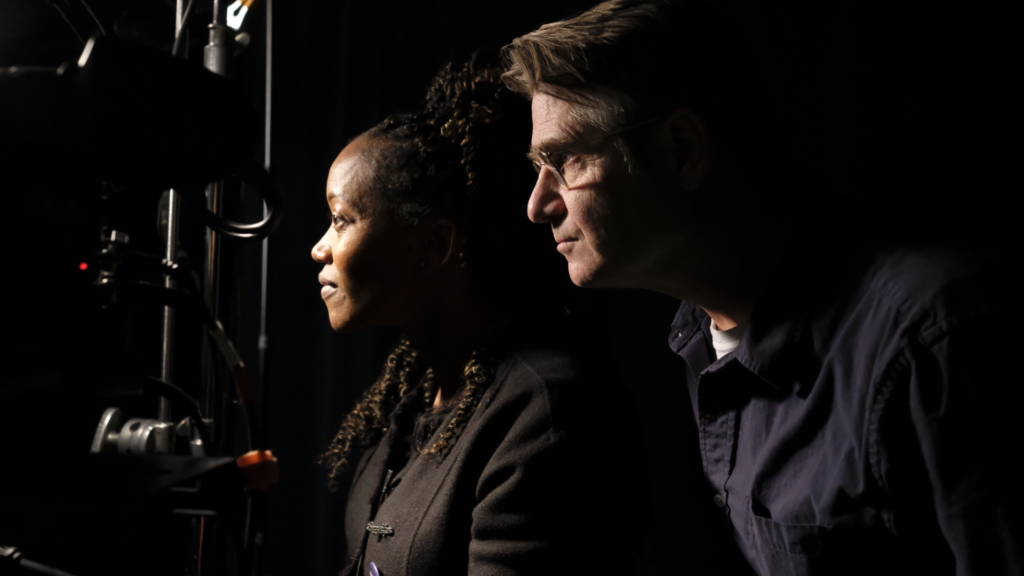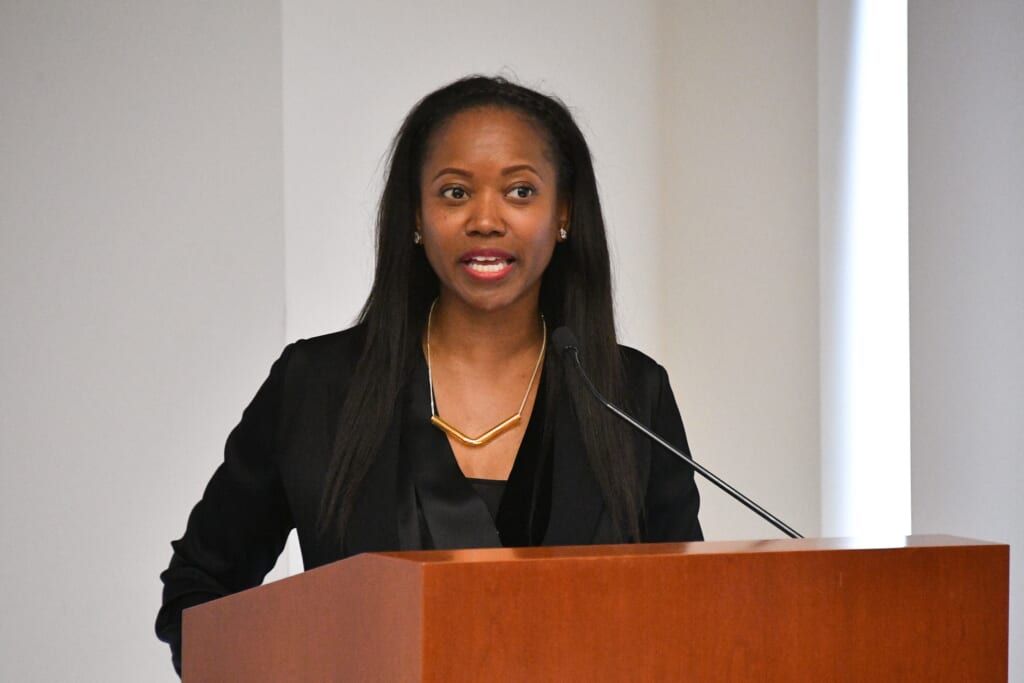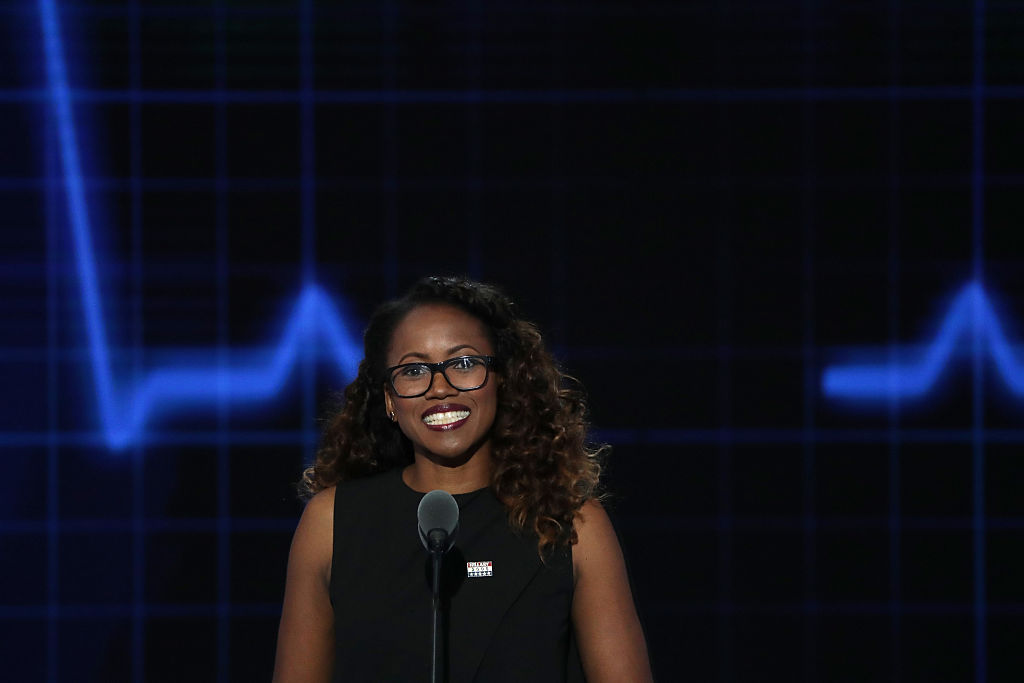Erika Alexander and Whitney Dow discuss their podcast ‘Reparations: The Big Payback’
Alexander shared why the atonement is so important to her as it continues to be a political trending topic.
Actress Erika Alexander has teamed up with award-winning filmmaker Whitney Dow for a new podcast that explores the full picture of reparations with arguments both for and against restitution for Black-American descendants of enslaved people.
Read More: Barack Obama credits his mother for career in public service in upcoming podcast
Alexander and Dow created Reparations: The Big Payback through her company Color Farm Media, and Charlamagne Tha God’s, and iHeartMedia’s The Black Effect Podcast Network. Together, they bring individual perspectives to the conversation and are joined by special guests and experts ranging from Rev. William Barber, Tom Steyer, Robin Rue Simmons, and more. While they analyze reparations, the creative podcast investigates the underlying racist architecture of modern businesses, laws, policies, and institutions that have their roots in slavery.

Both hosts have passionate reasoning for wanting to invest the time and talent in producing the unique broadcast.
“I think this subject is extremely important to both Erica and me. What we always say is, it’s interesting we traveled very different paths in life to end up in this place where we both feel that reparations, and trying to make amends to the devastation that slavery, put on black Americans as what we believe is the most important sort of national progress we need to undertake, essentially, that division that split that sin is at the core of so many of the things that we believe are dividing this country,” Dow said to theGrio during a phone interview.
He continued, “I’m also thinking it’s extremely important for white Americans, if they want to live as full Americans in this country and as moral people, they need to get involved in this fight and work to make reparations to Black Americans.”
She added her own reasoning for collaborating on the podcast which covers a sometimes controversial, laborious subject.
“I don’t have to tell you how difficult it’s been for Black people, not only just recently, but for hundreds of years, to live in a space where their whole being and their whole sense of themselves and story has been from a white point of view. And not just a white point of view, but a decidedly hostile environment. “Reparations” is supposed to be a discussion about what the future could bring, if we were properly supported with programs, money, [and] all sorts of other things would happen,” she shared.
“The fact that they can have a discussion in DC, about it for 30 years, shows you that white people don’t want to deal with it, and Black people don’t have enough power yet. To me, just having a discussion, being able to talk about it in whatever form is important to show that not only should it happen but if it does, these are the types of issues and these are the types of challenges that we have to get that will come, that will come up.”
theGrio reported Congresswoman Sheila Jackson Lee submitted H.R. 40, the Commission to Study and Develop Reparations Proposals for African Americans Act to uncover the lasting impact of slavery in the United States and to provide a monetary payout. H.R. 40 was first introduced by the late Rep. John Conyers in 1989. He brought the bill to the floor every year until his retirement in 2017.
Read More: Black HERstory Month: ‘What’s In It For Us’ podcast looks at femme social justice
Reparations: The Big Payback came together after the two hosts were introduced to each other by their mutual friend journalist and anchor Joy–Ann Reid about two years ago.
“Both of us had given commentary on her show and been friends with her, and she knew that we’re both interested in the subject matter. The podcast really started out as origins in a film we’re making together about reparations. One of the problems with films that is a linear medium, there’s a lot that gets left out, and so we talked about the idea of a podcast that goes much deeper in, in a more complex way into the subject,” Dow shared. “What you’re hearing, I like to think that I contribute, but it’s really Erika’s vision for what she wanted to bring to the world.”
Alexander added, “It’s a team effort. We have wonderful people who are working with us who have come from different backgrounds. Every one of them wanted to do this. It’s not because they’re getting paid a lot of money or that sort of thing. They wanted to be a part of something, a discussion they thought was relevant but also necessary. We do take the documentary space very seriously. Some of the aspects of each episode came from Whitney and me. I’m pretty much a mainstream sort of presence. I know what that feels like, and I wanted this to be accessible to people.”

Throughout the creation of the podcast, both hosts shared how they learned from the experience.
“Everything that I’ve learned is new to me. I’d like to say that I’ve come to a lot of things, having to learn as I go, and what’s not new to me is that Black people have been working hard in very difficult circumstances for hundreds of years, with very little help, and the people who have helped move it forward, but not enough to get to the point where Black people can even being taken seriously about addressing restitution for not only pain and suffering but also the labor,” Alexander shared.
“I also found out that, a lot of people think it’s just about a check or money. One of our experts, William Garrity said, you know, this thing is not just money. He’s talking about the federal government, not like any, one individual white person or Black person giving us a check. It’s about the United States government saying no, this needs to happen, we built our country on this and built institutions that have unfairly limited black advancement and their human potential.”

Dow added, “if you listen to the first episode when we visit the Wall Street and the slave market in New York City, I’m not sure I would have seen it in. Me going there with Erica forces me to look at it in a fundamentally different way, being there with someone that I care about, someone who’s being affected by it, and then I can’t sort of distance myself from it. I really think that what I’ve learned honestly is everything that I’ve looked at alongside Erica, trying to understand, has revealed things to me in a much more complex way and a more personal way.
He continued to discuss how he hopes other White people do not shy away from the conversation.
“I hope that me being there on the Black Effect [Network] as a white person talking about reparations, That it might give that it might invite white people who be afraid to introduce conversation to it but I also think that hopefully, for Black audiences, they can hear that there are white people out there that are willing to grapple with this complex subject matter, and hopefully I represent those as well.”
Color Farm Media was also behind last year’s critically acclaimed documentary film, John Lewis: Good Trouble. Alexander, who co-founded the company, says impactful work is the purpose behind the company.
“Our goal is not to give up, [and] to keep having these wonderful partnerships that come our way, and creating opportunity where we can but also learn to be better and how we can advance the conversation of real corporate inclusion and equity. That’s the goal of Color Farm Media, and we’re lucky enough to be doing things.”
Have you subscribed to theGrio’s podcast “Dear Culture”? Download our newest episodes now!
TheGrio is now on Apple TV, Amazon Fire, and Roku. Download theGrio today!
